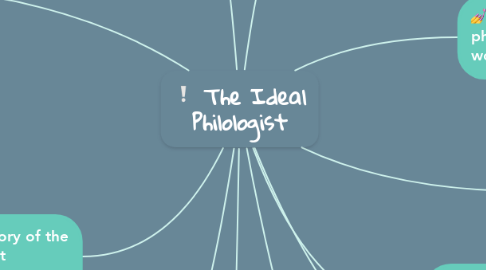The Ideal Philologist
by Волкодав Паркер

1. Etymology
1.1. Comes from the ancient Greek " love of learned conversations»
2. History of the philologist profession.
2.1. The foundations of the origin of Philology appeared in Ancient Greece.
2.2. In the middle Ages the work of a philologist meant the study of religious texts.
2.3. A new round of formation appeared in the Renaissance. During this period, scientists paid close attention to the study of national and" dead " languages.
2.4. The end of the eighteenth – mid-nineteenth centuries is called the stage of formation of a new Philology.
2.5. By the beginning of the twentieth century, the industry is divided into disciplines.
3. The skills of the philologist
3.1. Creation and interpretation based on literary and linguistic analysis of various text forms.
3.2. Transformation of available information, which includes editing and proofreading texts.
3.3. The systematization, generalization, abstracting and annotating of the text material.
4. Philologist and linguist – what is the difference?
4.1. The philologist is interested in the text itself and its hidden meaning. Creative work is conducted based on conclusions about the semantic load of the text, its author and the era in which the work was written.
4.1.1. Linguistics is a special branch of linguistics. It analyzes the text technically.
5. What does a philologist study?
5.1. Linguistics or linguistics: a technical approach to language learning.
5.2. The study of literary studies is mandatory.
5.3. Textual criticism and Paleography.
5.4. Translation and translation studies.
6. Is the profession of philologist in demand? On the one hand, complex work with texts is very popular in the modern world. On the other hand, scientific activities in the field of Philology can not be called in demand in the labor market. Its use is limited to teaching in educational institutions and working in research institutes.
7. The Philology profession attracted me because it is creative and covers many areas of life. I meet the requirements for my profession: I like to read, I am diligent, I have a rich imagination and a wide Outlook.
8. What does a philologist do?
8.1. Analyzes information in the field of linguistics.
8.2. Conducts work on unified scientific terms in different languages.
8.3. He teaches his own subjects.
8.4. Provides written translation of both fiction and scientific, technical literature and much more
9. Who can a philologist work for?
9.1. Teacher
9.2. Interpreter
9.3. Copywriter and blogger
9.4. A media employee
10. Personal qualities of a philologist
10.1. High literacy rate.
10.2. Patience and perseverance.
10.3. Thoroughness and care.
10.4. Ability to analyze and good memory.
11. Features of the profession
11.1. Be able and love to read large amounts of text information. A professional should read everything thoughtfully.
11.2. In research projects, the specialist will be helped not only by the knowledge gained, but also by a rich imagination, a broad Outlook and the ability to draw non-trivial conclusions.
11.3. The ability to work with people and public speaking skills will be necessary not only for teachers,but also for professionals working in publishing and media.


